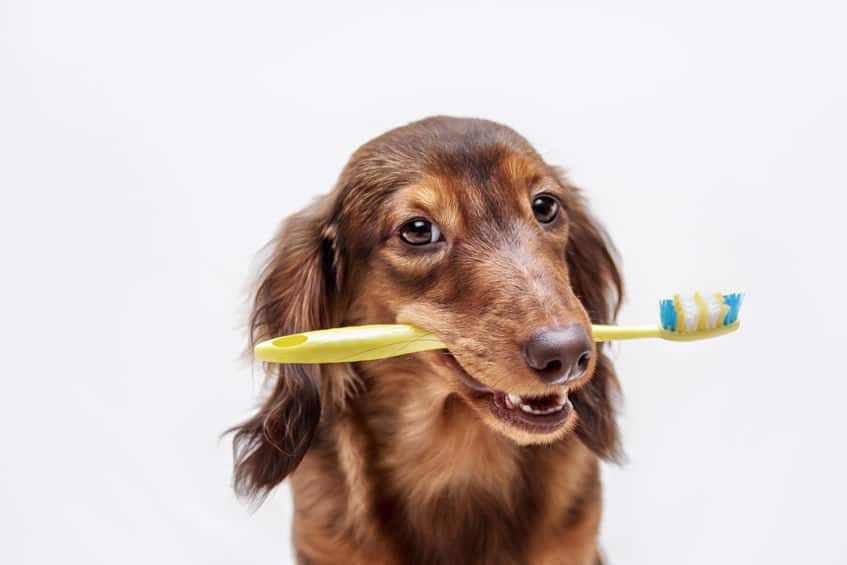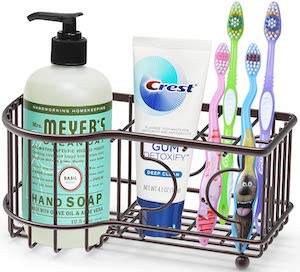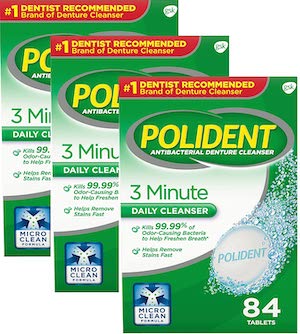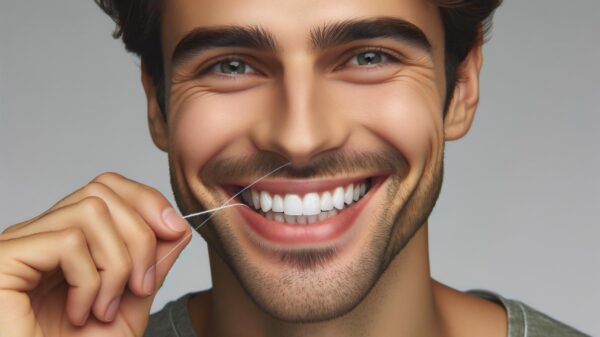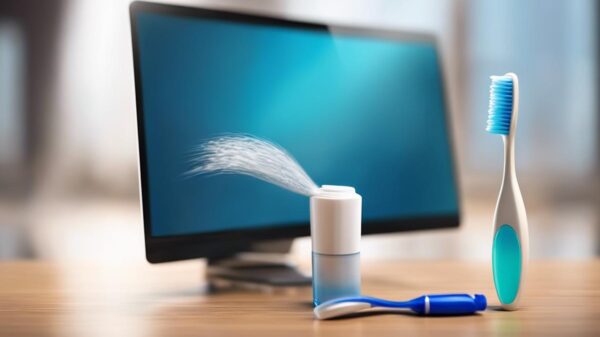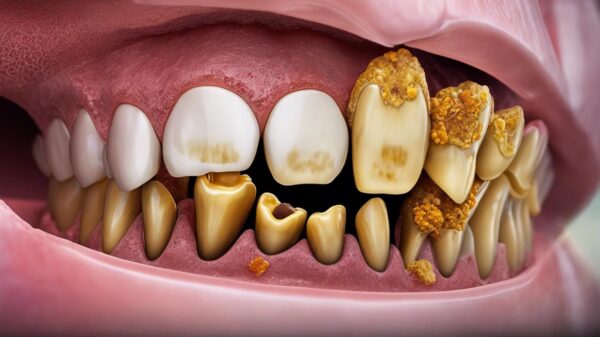Your toothbrush has one job: to clean your teeth and get rid of any lingering bacteria or food particles. I was thinking the other day about what happens to my tooth brush after I brush my teeth. I quickly realized that the very toothbrush that got rid of bacteria and food simply sits on the counter until the next use. If I don’t take care of my toothbrush properly, this can lead to a multitude of problems including a smelly toothbrush.
Why does my toothbrush smell bad? As a general rule, a toothbrush begins to smell bad when it is not able to dry completely between each use. The bacteria and food particles that linger on the toothbrush may be responsible for creating a musty odor after several uses. Using a toothbrush cover while storing your toothbrush will almost always lead to a toothbrush that no longer smells fresh.
In addition to a consistently damp toothbrush, there are a few other things that may be to blame for your smelly toothbrush. In this article, we will discuss the reasons why your toothbrush smells bad as well as reasons to address and prevent this issue in the future.
Understanding Why Your Toothbrush Smells Bad
It is no wonder that your toothbrush can begin to smell bad after a while. After all, it has quite a dirty job. After ridding your smile of plaque, bacteria, and food particles, your toothbrush simply sits on the countertop. When your toothbrush is not stored properly, this plaque and bacteria, along with other bacteria found in the bathroom, thrives.
Gross, right? Not only does a smelly toothbrush make your daily brushing routine unpleasant, but the microbes that can grow on your toothbrush can even lead to tooth decay, gum disease, or other illness.
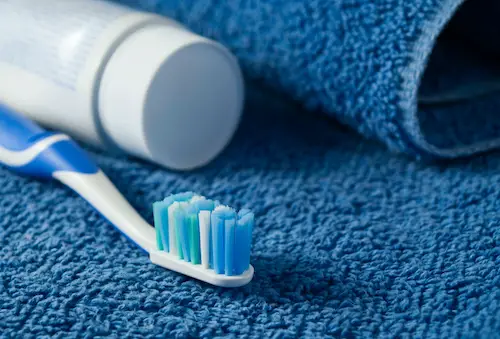 Considering Other Sources of Stinky Toothbrush Smells
Considering Other Sources of Stinky Toothbrush Smells
Although damp bristles leading to bacteria growth is the most common cause of unpleasant toothbrush odor, there are other, less common, culprits. If you notice that your toothbrush continues to smell after adjusting your toothbrush storage and cleaning habits, you may need to consider these other possible sources.
1. Poor Oral Hygiene
Your smelly toothbrush may simply be trying to send you a message! When you have poor oral hygiene habits, you are much more susceptible to halitosis, another name for bad breath. In some cases, your bad breath may be causing the bristles of your toothbrush to smell!
In order to keep your smile in tip-top shape, it is important to brush your teeth twice each day for two minutes each time. Flossing daily is also a critical step in establishing proper oral hygiene and eliminating the presence of unpleasant odors from your mouth.
2. Water Quality
The water quality in your home may also be causing the bristles of your toothbrush to smell bad. In certain areas of the country, you will notice that the tap water has a unique, often unpleasant, smell. If your toothbrush smells like sulfur, the water quality likely is to blame.
As long as your water is safe to drink, it is safe to use for toothbrushing. However, if the smell of your toothbrush discourages you from brushing your teeth, you may need to think of an alternative solution. Brushing your teeth with filtered water will help to eliminate the bad smell that is caused by the water in your sink.
3. Dietary Habits
Just like certain foods such as garlic or coffee cause your breath to smell, that smell can also transfer to the bristles of your toothbrush. This cause of toothbrush odor should be temporary, however, and is often remedied by simply brushing your teeth with a minty toothpaste.
4. Illness or Disease
The least common reason for toothbrush smells is the presence of illness or disease. If you cannot uncover the reason your toothbrush smells bad, it is important to discuss this matter with your dentist during your next visit. Dental crowns that are beginning to fall apart, cavities, gum disease, or other illnesses could be causing an excess of bad odors that have permeated the bristles of your toothbrush.
Keeping Your Toothbrush Clean
So, how do you eliminate the threat of bacteria growth and rid your toothbrush of its unpleasant odor? The best way to do so is by practicing proper brushing techniques and toothbrush storage habits. Here are some important tips for keeping your toothbrush clean.
1. Always Rinse Your Toothbrush
After brushing your teeth, it is imperative that you thoroughly rinse your toothbrush. Rinse your toothbrush until the water runs clear with no presence of leftover toothpaste. This step is crucial in eliminating the presence of any food particles that are trapped between the bristles of your toothbrush.
Following a thorough rinse, give your toothbrush a good shake to begin the drying process.
2. Allow Your Toothbrush to Thoroughly Dry After Each Use
As mentioned before, the most common culprit behind a toothbrush that smells bad is not allowing your toothbrush to dry thoroughly between each use. When your toothbrush is not able to dry quickly, bacteria and plaque thrive. This can lead to the growth of a multitude of bacteria within the bristles of the toothbrush you use to clean your mouth.
3. Store Your Toothbrush Properly
The most effective way to ensure that your toothbrush remains clean and void of odors is to store it properly. Many people are afraid of the many types of bacteria that exist in even the cleanest bathrooms. Because of this, they use a toothbrush cover or store their toothbrush in a closed cabinet.
Most toothbrush covers are not designed for long-term storage. While they are effective in protecting the bristles of your toothbrush from outside bacteria, they create a damp environment in which the bacteria from your mouth can thrive. The same goes for most closed cabinets or drawers in your bathroom.
The best way to store your toothbrush is to use a toothbrush holder or a cup situated on your bathroom counter. This allows your toothbrush to stand on end, allowing gravity to work by letting the excess water drip off the bristles. It is important to position your toothbrush holder as far away from the toilet area as possible to eliminate the transfer of harmful bacteria.
Be careful to avoid cross-contamination by purchasing a toothbrush holder that separates each toothbrush in the holder. If you prefer to store your toothbrush behind the closed doors of your medicine cabinet, ensure that the bristles can dry thoroughly between each use.
You can find more information on how to store your toothbrush here.
4. Replace Your Toothbrush Regularly
Even if you store your toothbrush properly and follow proper procedures after brushing, it is important to replace your toothbrush regularly. While you may get a new toothbrush during your bi-annual visits to the dentist, it is recommended that you replace your toothbrush every 3 to 4 months to eliminate bacteria and clean your teeth properly.
There are other times when it is important to replace your toothbrush such as following a vacation, immediately after an illness, or when your toothbrush begins to show signs of damage.
How to Remove Smells from Your Toothbrush
If you recently noticed that your toothbrush has an odor, but it is not time to replace your toothbrush yet, you may benefit from one of the following toothbrush cleaning tips.
1. Soak Your Toothbrush
Soaking your toothbrush in an antibacterial mouthwash may help to eliminate the bad smell. An extra benefit of this cleaning procedure is that it leaves your toothbrush minty fresh for your next brushing. Experts recommend soaking your toothbrush for up to 15 minutes.
If you do not have time to soak your toothbrush, you can also use this method to simply rinse the bristles quickly before each use. Pour a small amount of fresh mouthwash into a clean cup or jar, swirling the toothbrush in the liquid for 30 seconds. Brush your teeth as normal, returning your toothbrush to an upright storage position once you are finished rinsing.
2. Use Denture Cleaner
Another way to rid your toothbrush of bad smells is to use denture cleaner. You can purchase denture cleaning tablets from almost any store. Simply follow the instructions on the back of the packaging, allowing your toothbrush to soak as directed. This will successfully eliminate any of the harmful bacteria that may be hiding in the bristles of your toothbrush.
 3. Replace Your Toothbrush
3. Replace Your Toothbrush
If you have attempted the following cleaning methods with no luck, it is time to replace your toothbrush. Purchasing a new toothbrush is the only surefire way to eliminate bacteria from your bristles once and for all.
There are many other methods for disinfecting your toothbrush and eliminating unusual odors including using the microwave or dishwasher. While these methods may be successful in eliminating the odor-causing bacteria, they have the potential to damage your toothbrush, leading to gum or tooth injuries.
It is important to note that if you decide to disinfect the toothbrushes of multiple family members, you must clean each toothbrush separately. Using the same liquid to clean each toothbrush may simply exacerbate the problem due to the cross-contamination of bacteria.
While many people may experience smelly toothbrushes from time to time, it is certainly not normal. If you notice that your toothbrush is anything less than minty fresh, you must take steps to correct and prevent the situation. Following the advice within this article will help you ensure that your toothbrush bristles are fresh and free of harmful bacteria.
Thank you for reading Modern Dental Hygiene! You can find great dental hygiene tips here.



